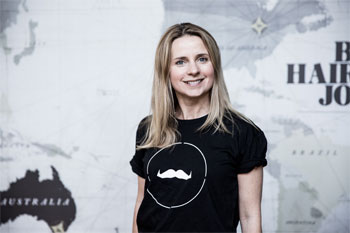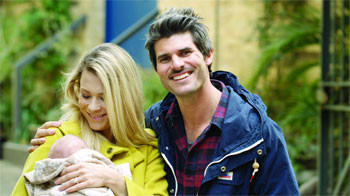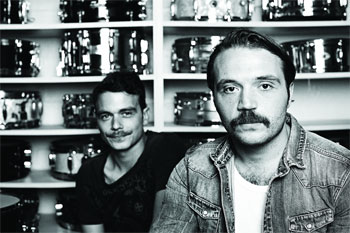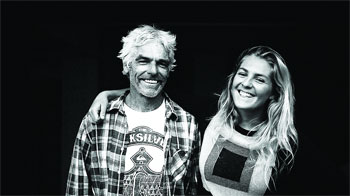Charlotte Webb Movember Interview

The Movember Foundation Asks You To Imagine A 'Life Without The Men You Love'
Sometimes we don't miss what we have until it's gone. In a heart-warming moment redefining modern masculinity, 'the little things' prevailed when men across Australia, Canada, the United Kingdom and the United States were asked 'what they would miss most' if they were no longer around, according to research* released by the Movember Foundation.
Interestingly, the little things were what 75% of men's loved ones would miss most about them if they were gone tomorrow - including his stories (18%) and his advice (16%) to his smile (8%) and his laugh (5%) to his jokes (9%) and quiet time together (18%).
These findings mark the launch of -Movember', the month formerly known as November. On Wednesday, November 1, 2017, the Movember Foundation, the only global charity solely focused on men's health, is driving home the scale of the global men's health crisis by asking everyone to take a moment to consider what life would be like if they woke up today without the men that they love. What key moments would these men miss? Who would they leave behind? For the men themselves, what would they miss the most?
Movember Development Manager, Kieran Ryan, who grew up in regional Victoria, said it was the little things that he missed the most when he lost two friends during his early 20s, after they took their own lives following ongoing mental health battles.
"There's a lot of little things I miss about the boys now that they're no longer here, that I didn't fully appreciate at the time," Mr Ryan says. "With Liam it was his mischievous nature, the cheeky smile on his face when he was clearly up to no good; and for Marc it was his bellowing laugh and his energy for life, he was the kind of bloke who would just drop everything and rock up at your front door."
'True love' and 'personal relationships' were also a common theme that men would miss. After friends and family (84%), a third (33%) of men surveyed confirmed they don't want to miss out on true love – even more so than becoming a millionaire (24%) or visiting the Seven Wonders of the World (24%).
Furthermore, the data revealed that although we live in a digital age, texting isn't enough because old school communication still means the most when keeping in touch with loved ones. Across markets, two in five people surveyed (43%) say -in person' communication means the most, followed by a third (34%) who say a -phone call' is the most meaningful.
When it comes to keeping tabs on the wellbeing of the men in their life, women check in the most – within the past week, almost three quarters (72%) of women surveyed across markets have asked a man in their life how they are doing and over two thirds (68%) have given him a hug.
And, while men are very aware of their own mortality when it comes to facts and figures – with almost three in five men (58%) believing the statement that men die on average six years earlier than women – over one fourth (27%) of women take a more proactive role in managing the health of the men they care about (e.g. asking if they had a check-up lately (18%) or schedule a doctor or dentist appointment for them (17%).
 When men were asked what they would miss most (after family/friends), 58% of Australian men shared they would miss their daily rituals (morning coffee (21%), ice cold beer (18%), lazy Sundays (15%), driving their car (18%) and date night (11%)).
When men were asked what they would miss most (after family/friends), 58% of Australian men shared they would miss their daily rituals (morning coffee (21%), ice cold beer (18%), lazy Sundays (15%), driving their car (18%) and date night (11%)).
Movember developed this year's campaign to spark important conversations about the state of men's health and to help preserve the lives of men throughout the world.
Across the world, men die an average six years younger than women, and for reasons that are largely preventable. The stats are startling:
1 in 8 men will get prostate cancer in their lifetime
1 in 2 men will be diagnosed with cancer
Testicular cancer is the most common cancer diagnosed in men ages 15-29
3 out of 4 suicides are men
More than 500,000 men take their own life every year. That's one every minute.
'When we look at these stats, it becomes so clear that there is a men's health crisis," says Owen Sharp, CEO, Movember Foundation. 'There is a lot that needs to be done, but by talking about it, by encouraging our friends to take action for their health and supporting them, we can help keep the men we love around to live happier, healthier, longer lives. They don't have to miss out on those key moments that matter most."
To kick off the campaign this Movember 1st, not only are we asking everyone to think about what their life would be like without the men they love, we are asking them be the difference and take action to support the health of their loved ones, and themselves.
Here's how you can help:
Grow a Mo, save a Bro
The moustache is the Movember Foundation's ribbon for men's health. Use it to raise funds as a walking billboard for men's health.
Sign up to grow your moustache for 30 days. Want to take your Mo to the next level? Sacrifice your beard, auction off your face to the highest donor, or dye your Mo a different colour every day. Get creative to attract attention and raise funds.
Move - get active for men's health
Raise funds for men's health while you do something good for your own health. Join the Move challenge and make a commitment to be more physically active for the month. Get friends and family to donate to your efforts, and become healthier in the process.
Donate
Show the Mo Bros and Mo Sistas in your life that you support their Movember challenge by donating to their Mo Space. You can check in on their progress to see how their Mo is growing, or see how far along they are in their Move goal. Every little bit counts to help stop men dying too young.
Choose how you'll get involved and get your friends, your family or your workplace on board. Spread the word, start a conversation, and raise money for vital men's health programmes.
The Movember Foundation is working to help men live longer, happier, healthier lives. With money raised, the Foundation has funded over 1,200 game-changing programmes in prostate cancer, testicular cancer and suicide prevention around the world, whilst positively challenging the way in which men's health issues are researched and addressed.
Be the difference. Join the fight at Movember.com and donate or sign-up to help stop men dying too young.
 The Movember Foundation is the only global charity focused solely on men's health, funding over 1,200 innovative projects across 21 countries. The Foundation raises funds and awareness for men's health programs supporting these critical areas: prostate cancer, testicular cancer, mental health and suicide prevention. But our work is not done. Be the difference and go to Movember.com to donate or participate. Together we can stop men dying too young.
The Movember Foundation is the only global charity focused solely on men's health, funding over 1,200 innovative projects across 21 countries. The Foundation raises funds and awareness for men's health programs supporting these critical areas: prostate cancer, testicular cancer, mental health and suicide prevention. But our work is not done. Be the difference and go to Movember.com to donate or participate. Together we can stop men dying too young. Interview with Charlotte Webb, Movember Foundation's Country Director (Australia and New Zealand)
Question: Can you talk us through what was found from the latest Movember research?
Charlotte Webb: "I've noticed that you're not going out with us much at the moment. Is everything OK?"
"You seem less chatty than usual. How are you going?"
"You're looking pretty tired. Are you getting much sleep?"
The 'Life Without the Men You Love' survey marks the launch of -Movember': this year we are driving home the scale of the global men's health crisis asking everyone to think about what their life would be like without the men they love.
The heart-warming global survey – conducted across Australia, Canada, the UK and the US – asked men 'what they would miss most' if they were no longer around, and revealed that the modern man most values his 'personal relationships' the 'little things' in life and 'true love' – sparking an important conversation about the need to stop men from dying too young.
Question: What were the most common responses from this research?
Charlotte Webb: After friends and family (84%), a third (33%) of men surveyed confirmed they don't want to miss out on true love – even more so than becoming a millionaire (24%) or visiting the Seven Wonders of the World (24%).
We also found that 58% of Australian men would most miss (after family and friends) their daily rituals like morning coffee (21%), ice cold beer (18%), lazy Sundays (15%), driving their car (18%) and date night (11%).
Question: What surprised you about the research?
Charlotte Webb: It was surprising that only half of men (58%) believed the statement that men die on average six years earlier than women.
Question: How can we approach the topic of mental health with the men in our lives?
Charlotte Webb: The first step in looking out for a man, is asking him how he's doing. Then just listen. Sometimes listening is the most helpful thing you can do. You won't make things worse by asking how he's doing. Don't try to diagnose his problems, offer solutions or give advice – as counter-intuitive as it seems, he might just need some help in telling his story. Take what he says seriously, and don't judge him or how he's reacting to whatever's going on in his life.
Question: What open questions can we use for those men who we think may be struggling?
Charlotte Webb: There's a few simple things you can do to encourage him to keep talking. It's best to ask open-ended questions, or asking about things he's said, for example:
"I saw your Facebook post and I'm a bit worried about you. Do you have time for a chat?"
"You seem a bit stressed these days. Is anything up?"
"Being a dad must be a pretty big deal. How are things going with the kids?"
"How are things at home?"
"Work sounds tough at the moment. Does it feel that way for you?"
Or you can jump online and find all the resources you need at: www.movember.com/iwanttoask
 Question: How can women get involved in Movember, this year?
Question: How can women get involved in Movember, this year? Charlotte Webb: Anyone can get involved in Movember through Move. You don't have to be the fittest or the fastest, it's about havin' fun, doin' good and raising funds along the way. Set yourself a distance goal, ask your network to sponsor your efforts and have some fun! You can Move solo or in a team, you simply set a distance goal and Move it your way.
Question: How are you participating in your own Movember campaign?
Charlotte Webb: Last year I set myself an epic Move challenge, but noticed that my personal network really responded to the importance of the cause, rather than to what I was doing, so it is the importance of our cause that I am really focussed on this year.
Question: What do you hope to achieve from Movember, this year?
Charlotte Webb: We aim to raise as much money and awareness as possible to help Aussie men live longer, healthier, happier lives. Last year we were bowled over by the amazing support of the Aussie community. Every dollar raised counts and every conversation about men's health that we help to ignite makes a difference.
Question: Where does the money raised go?
Charlotte Webb: The money raised through Movember helps to fund over 1,200 innovative men's health projects across 21 countries, focussing on Prostate Cancer, Testicular Cancer and Mental Health and Suicide Prevention. In Australia, Movember funds projects including:
The newly launched Social Innovators Challenge will develop, pilot and evaluate 5 innovative projects to restore and strengthen the social connections of men, particularly those who are at greater risk of becoming socially isolated.
Last month, the Movember Foundation also helped to ignite potentially life-saving conversations through their Unmute – Ask him campaign - shedding light on the role of men's support networks – family, friends and partners – who can help men to remain mentally well through practicing active listening and maintaining social connections.
Now operating across six countries, TrueNTH is Movember's most significant global investment yet made to improve the quality of life for men with prostate cancer and their families. This is a revolutionary new global care intervention program that will help men living with prostate cancer to access care and support that enhances their quality of life.
Funded by Movember and aired on the ABC last year, the Man Up documentary series demonstrated a positive impact on those men who watched it, with research finding that 87% of men had gained a deeper understanding about the pressure placed on men to conform to a -man code'; 73% became more confident about reaching out to someone who they knew is struggling, and 61% had offered a friend time to talk.
Interview by Brooke Hunter
MORE



